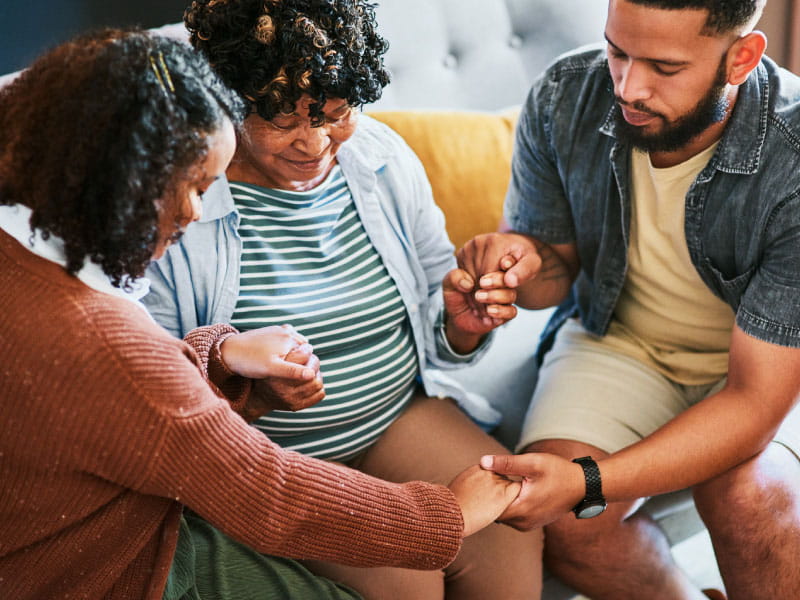Black adults' religious practices linked to better heart health measures
By American Heart Association News

Black adults who frequently attend church or have a deep sense of spirituality are more likely to meet key measures for good cardiovascular health, such as regular exercise, a balanced diet and maintaining blood pressure in the normal range, new research finds.
The study, published Wednesday in the Journal of the American Heart Association, is the first to investigate the association between religious practices and spirituality among Black adults and adherence to a set of behaviors and other factors considered by the American Heart Association to be critical in achieving optimal cardiovascular health.
"Health professionals and researchers should acknowledge the importance of religious and spiritual influences in the lives of African Americans – who tend to be highly religious," lead study author Dr. LaPrincess C. Brewer said in a news release. She is a preventive cardiologist and assistant professor of medicine at Mayo Clinic in Rochester, Minnesota.
"With religious and spiritual beliefs factored into our approaches, we may make major breakthroughs in fostering the relationship between patients and physicians and between community members and scientists to build trust and sociocultural understanding of this population," she said.
According to a 2017 AHA scientific statement, Black adults have overall poorer cardiovascular health and higher cardiovascular disease death rates than their non-Hispanic white peers.
AHA's Life's Simple 7, developed in 2010, described three behaviors (diet, physical activity and nicotine exposure) and four physiological factors (weight, cholesterol, blood pressure and blood glucose levels) important for good cardiovascular health. Sleep was added as an eighth component in June 2022, when the list was renamed Life's Essential 8.
Researchers analyzed health and religious data collected through in-depth interviews, health screenings and surveys for 2,967 participants in the Jackson Heart Study who identified as African American. Participants – 66% of whom were women – were on average 54 years old. The Jackson Heart Study is the largest community-based investigation of cardiovascular disease among Black adults in the U.S. Ongoing since 1998, it includes more than 5,000 adults living in the area around Jackson, Mississippi.
Overall, those who reported more religious activity or having deeper levels of spiritual beliefs were more likely to meet the measures of good cardiovascular health.
Those who attended religious services or activities more frequently had a 16% higher odds of meeting intermediate or ideal metrics for physical activity, 10% higher odds of eating a heart-healthy diet, 50% higher odds of not smoking and 12% higher odds of maintaining good blood pressure than those with less frequent church attendance. They had a 15% higher likelihood of achieving an intermediate or ideal composite cardiovascular health score.
Those who reported more frequently engaging in private prayer had 12% greater odds of achieving intermediate or ideal metrics for diet and 24% greater odds of not smoking. Religious coping was associated with 18% higher odds of achieving intermediate or ideal levels of physical activity, 10% higher odds of eating a heart-healthy diet, 32% higher odds of not smoking and 14% higher odds of having an intermediate or ideal composite cardiovascular score.
Total spirituality was associated with 11% higher odds of achieving intermediate or ideal levels of physical activity and 36% higher odds of not smoking.
Measures of religiosity and spirituality were taken at a single point in time, so it's unknown how they affected cardiovascular health over time.
"I was slightly surprised by the findings that multiple dimensions of religiosity and spirituality were associated with improved cardiovascular health across multiple health behaviors that are extremely challenging to change, such as diet, physical activity and smoking," Brewer said.
The findings highlight the importance of culturally tailored health efforts in advancing health equity, especially for socioeconomically disenfranchised communities faced with multiple challenges, she said.
"The cultural relevance of interventions may increase their likelihood of influencing cardiovascular health and also the sustainability and maintenance of healthy lifestyle changes," Brewer said. "Religiosity and spirituality may serve as a buffer to stress and have therapeutic purposes or support self-empowerment to practice healthy behaviors and seek preventive health services."
If you have questions or comments about this American Heart Association News story, please email [email protected].





